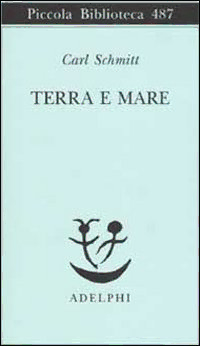
Terra e mare. Una riflessione sulla storia del mondo PDF
56 Pages·2002·33.601 MB·Italian
Most books are stored in the elastic cloud where traffic is expensive. For this reason, we have a limit on daily download.
Preview Terra e mare. Una riflessione sulla storia del mondo
Description:
Polar opposition that has characterized the genesis of modern Europe. In 1942, totally isolated in the war in Berlin, Carl Schmitt decided to write to his beloved daughter Anima, this remarkable essay in the form of narrative, which traces the modern history of Europe in the light of a fundamental opposition: that between the earth and the sea. This is not just two elements, two forces of nature, two habitats which determine human life. Schmitt shows how the land and the sea in their polarity, are the components of an engine of the secrets of history, the two key references on which Europe has given its institutions, its politics, its right internationally. With a few masterful case, showing of genuine wisdom literature, Schmitt therefore outlines the genesis of modern Europe - with its system of sovereign states and its jus publicum europaeum - interpreted in the context of the dualism of law and continental maritime law, the expression of which more vigorous and obvious would be the struggle between Napoleonic France and England. And the reader will recognize, in essence, that great vision of a "Nomos of the Earth" that Schmitt will develop after the war, the fundamental Treaty namesake. "In reality we are just opposite the end of the relationship between land and sea prevailed so far. Yet the fear of the new human is often as great as the fear of emptiness, even when the new represents the excess of empty. So many see only a disorder devoid of meaning where in fact a new way is fighting for his order. There is no doubt that the old nomos is failing, and with it a whole system of measures, standards and reports handed. Not so, however, what year is no measure or nothing hostile to the nomos. Even in the fierce struggle between the old and new forces are born right thing and make sensible proportions. "
See more
The list of books you might like
Most books are stored in the elastic cloud where traffic is expensive. For this reason, we have a limit on daily download.
